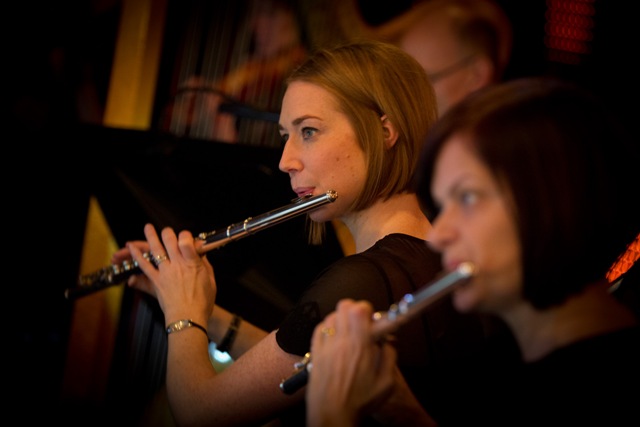The BBC Philharmonic knows what it’s doing. It got its new season off to a flying start with a thundering display of power, passion and precision. Beethoven was on the menu at the Bridgewater Hall in Manchester, and the MediaCity-based orchestra was quick to sink its teeth into his somewhat neglected Fourth Symphony.
I must confess that prior to the performance I was largely unfamiliar with Beethoven’s fourth, which given that it’s his least well known symphony probably placed me firmly in the majority on the night. But I rapidly found myself warming to the piece and the lack of familiarity leant the whole experience a curious and re-occurring sense of discovery and re-discovery, not least because as it gained momentum it proved a surprisingly testing musical workout. Time and again I found my admiration for it growing, only to be suddenly struck by the realisation that of course it was excellent work, it was Beethoven!
As familiarity grew, the great man’s musical DNA began to repeatedly reveal itself throughout the piece, but the ghostly influence of Haydn proved to be something of symphonic deus ex machina, giving momentum to melody and lending the work a gravitas that was occasionally lacking elsewhere.
T he performance itself was strengthened by the adroit leadership of Juanjo Mena, now in his third season as chief conductor with the BBC Philharmonic. Mena is clearly a man who loves his work. It seemed, at least from the hall, that he was a conductor who led his musicians with a light touch, primarily coxing a fine performance from them rather than demanding one and, in the process, the idiosyncrasies were glorious to behold. At times he positively danced upon the podium – I’m reliably informed by a BBC insider that he has taken salsa lessons – and there were occasions in which he seemed to float on an invisible magic carpet of sheer enthusiasm. And that enthusiasm was infectious, spreading first to the orchestra and then quickly through the audience, drawing us all deeper and deeper into the music.
he performance itself was strengthened by the adroit leadership of Juanjo Mena, now in his third season as chief conductor with the BBC Philharmonic. Mena is clearly a man who loves his work. It seemed, at least from the hall, that he was a conductor who led his musicians with a light touch, primarily coxing a fine performance from them rather than demanding one and, in the process, the idiosyncrasies were glorious to behold. At times he positively danced upon the podium – I’m reliably informed by a BBC insider that he has taken salsa lessons – and there were occasions in which he seemed to float on an invisible magic carpet of sheer enthusiasm. And that enthusiasm was infectious, spreading first to the orchestra and then quickly through the audience, drawing us all deeper and deeper into the music.
With its musical pores thoroughly opened, the audience returned from the interval with a palpable air of excited expectation, which was amplified by our first sight of the City of Birmingham Symphony Orchestra Chorus. The CBSO had taken up post above the platform, but so numerous were they that this great phalanx completely filled the abundant choral seating area, flanking the orchestra on both sides. The ranks of choral Hoplites, smartly and uniformly attired, held their position and bided their time as Mena raised his baton…and so it began.
There are few pieces of music as grand, as powerful, and as accomplished as Beethoven’s Ninth Symphony. Since its triumphant Viennese premiere in 1824, this ground-breaking work has been beloved by audiences across the globe, and is considered by many to be not only Beethoven’s greatest work but also one of the greatest pieces of music ever written. Stylistically it represents an important bridge between the Classical and Romantic periods in western music, breaking as it did the patterns of the former and foreshadowing much that was to come from the latter. Its polished complexity was the product of decades of work by Beethoven, who by the time of its glorious first performance had finally lost his hearing altogether.
As the first of its four movements began, and strings began to sing, the Adagio sent the souls of everyone present gently drifting towards a heaven of Beethoven’s own creation…oh the strings, the strings!
And yet, as the tempo began to rise and fall, the call to glory following Allegro gave us a glimpse of the exquisite fervour that awaited us. As the tension steadily grew for musicians and audience alike, we crept, inch by inch, towards the edge of our seats, and still the massed ranks of choristers maintained their discipline, holding themselves erect in their seats. Then, at last, early in the fourth movement, the first strains of Ode to Joy began to reach our eager ears, led with great delicacy by the cellists, and rapidly building to a critical mass throughout the rest of the orchestra. Finally, and triumphantly, the first words of Friedrich Schiller’s poem, his hymn to the brotherhood of mankind, burst forth and thundered into our collective conscious, and it was magnificent.
The four vocal soloists – John Daszak (tenor), Raquel Lojendio (soprano), Alastair Miles (bass) and Clara Mouriz (mezzo-soprano) – proceeded to give what can only be described as magisterial performances. And the choir…oh the choir, the choir! When finally released, the passion of the CBSO burst forth with a potent precision that simply had to be heard to be believed. As Schiller’s words sprang forth, the choir were visibly leaning into their work, relishing every vowel, every syllable and delivering a fine performance that left the audience absolutely breathless with admiration.
When finally it was all done and the last symbol clashed, the last expression of the Germanic had faded, the audience rose to its feet and clapped and cheered the orchestra, conductor, choir and soloists to the heavens, for they had truly given us a wonderful, unforgettable night, as indeed had the great man himself…thank you Ludwig, thank you.
 What: The BBC Philharmonic – the opening of the 2014/15 season, Juanjo Mena conducting
What: The BBC Philharmonic – the opening of the 2014/15 season, Juanjo Mena conducting
Where: The Bridgewater Hall, Manchester
More info: www.bbc.co.uk/philharmonic; www.bridgewater-hall.co.uk












